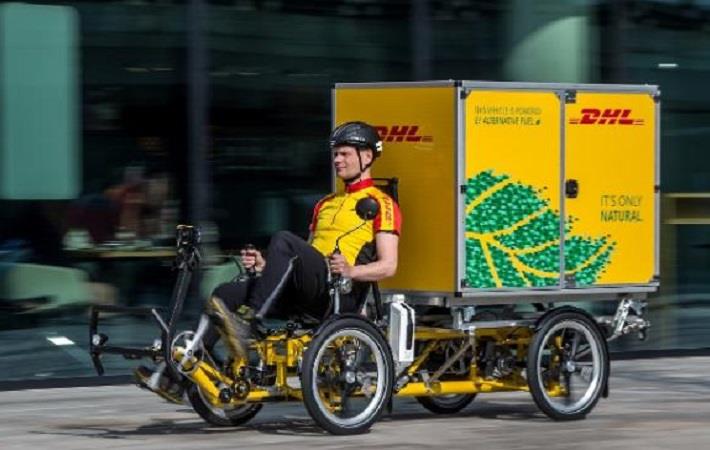Interviews
News Flash
AI, robotics, IoT, sustainability to shape logistics trend
28 Sep '20
3 min read

Pic: DHL
The fifth edition of the DHL Logistics Trend Radar has revealed 29 key trends that will affect the logistics industry over the next years. These include big data analytics, robotics and automation, the Internet of Things (IoT)—all of which are underpinned by a steady progress in artificial intelligence, quantum computing (QC), growing e-commerce and sustainability.
Over 20,000 logistics professionals and technology experts shared their perspectives on the future of the industry when visiting the DHL Innovations Centres over the last two years.
The findings are consolidated and reflected on the Logistics Trend Radar which acts as a dynamic and strategic foresight tool that tracks the evolution of trends spotted in past editions, identifying present and future trends with every update.
“The next big challenge will be future proofing the logistics workforce through training and upskilling in increasingly technologically sophisticated operations. This will take center stage on the strategic agendas of supply chain organizations in the years to come,” said Matthias Heutger, senior vice president, global head of innovation & commercial development at DHL, in a press release.
The Radar indicates the world is experiencing an overall stabilization of trends from the past four years. However, with the logistics industry weathering the current global pandemic, transformation processes have been accelerated. COVID-19 has driven changes regarding recent logistics innovation, automation, and digital work more rapidly and has accelerated industry digitalisation by years.
Conversely, many trends initially perceived as disruptive game-changers for the logistics industry have yet to deliver on their disruptive potential. Self-driving vehicles and drones continue to be held back by legislative and technical challenges as well as limited social acceptance. Logistics marketplaces are stabilising on a few leading platforms, and established forwarders are entering the game with their own digital offerings, backed with robust global logistics networks.
Modernising all touchpoints of supply chains—from an elegant digital or customer journey to fulfillment transport and final mile delivery—is the new imperative for long-term success, DHL said.
The coronavirus pandemic has served not only to accelerate both e-commerce growth and supply chain innovation agendas, key moves to scale and adopt new technology like intelligent physical automation, IoT-powered visibility tools and predictive capabilities from AI will ultimately determine the ability to fulfill heightened customer demands and secure industry leadership positions in the future, DHL said.
With governments, cities and solution providers commit to cut down on carbon dioxide emissions and waste, sustainability now is an imperative for the logistics industry. Sustainable Logistics—optimisation of processes, materials, new propulsion techniques and smart facilities—provide huge potential for logistics to become more environment-friendly.
Smart containerisation in transportation will also be important in developing environment-friendly formats for delivery in congested cities, the DHL report added.
Over 20,000 logistics professionals and technology experts shared their perspectives on the future of the industry when visiting the DHL Innovations Centres over the last two years.
The findings are consolidated and reflected on the Logistics Trend Radar which acts as a dynamic and strategic foresight tool that tracks the evolution of trends spotted in past editions, identifying present and future trends with every update.
“The next big challenge will be future proofing the logistics workforce through training and upskilling in increasingly technologically sophisticated operations. This will take center stage on the strategic agendas of supply chain organizations in the years to come,” said Matthias Heutger, senior vice president, global head of innovation & commercial development at DHL, in a press release.
The Radar indicates the world is experiencing an overall stabilization of trends from the past four years. However, with the logistics industry weathering the current global pandemic, transformation processes have been accelerated. COVID-19 has driven changes regarding recent logistics innovation, automation, and digital work more rapidly and has accelerated industry digitalisation by years.
Conversely, many trends initially perceived as disruptive game-changers for the logistics industry have yet to deliver on their disruptive potential. Self-driving vehicles and drones continue to be held back by legislative and technical challenges as well as limited social acceptance. Logistics marketplaces are stabilising on a few leading platforms, and established forwarders are entering the game with their own digital offerings, backed with robust global logistics networks.
Modernising all touchpoints of supply chains—from an elegant digital or customer journey to fulfillment transport and final mile delivery—is the new imperative for long-term success, DHL said.
The coronavirus pandemic has served not only to accelerate both e-commerce growth and supply chain innovation agendas, key moves to scale and adopt new technology like intelligent physical automation, IoT-powered visibility tools and predictive capabilities from AI will ultimately determine the ability to fulfill heightened customer demands and secure industry leadership positions in the future, DHL said.
With governments, cities and solution providers commit to cut down on carbon dioxide emissions and waste, sustainability now is an imperative for the logistics industry. Sustainable Logistics—optimisation of processes, materials, new propulsion techniques and smart facilities—provide huge potential for logistics to become more environment-friendly.
Smart containerisation in transportation will also be important in developing environment-friendly formats for delivery in congested cities, the DHL report added.
Fibre2Fashion News Desk (DS)
Popular News
Leave your Comments
Editor’s Pick
































-Ltd..jpg?tr=w-120,h-60,c-at_max,cm-pad_resize,bg-ffffff)





.jpg?tr=w-120,h-60,c-at_max,cm-pad_resize,bg-ffffff)
.jpg?tr=w-120,h-60,c-at_max,cm-pad_resize,bg-ffffff)






